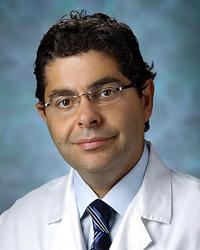Research Lab Results
-
Quantitative Imaging Technologies
Research in the Quantitative Imaging Technologies lab — a component of the Imaging for Surgery, Therapy and Radiology (I-STAR) Lab — focuses on novel technologies to derive accurate structural and physiological measurements from medical images. Our team works on optimization of imaging systems and algorithms to support a variety of quantitative applications, with recent focus on orthopedics and bone health. For example, we have developed an ultra-high resolution imaging chain for an orthopedic CT system to enable in-vivo measurements of bone microstructure. Our interests also include automated methods to extract quantitative information from images, including anatomical and micro-structural measurements, and shape analysis.
-
Interventional Cardiology Research Group
Our group is interested in a broad array of clinical and translational investigations spanning the evaluation of basic pathophysiology in patients undergoing cardiac procedures, development and evaluation of new therapeutic strategies, and improving patient selection and outcomes following interventional procedures. We are comprised of a core group of faculty and dedicated research nurses as well as fellows, residents, and students. Projects range from investigator-initiated single-center observational studies to industry-sponsored multicenter phase 3 randomized controlled trials. We have established a database of all patients who have undergone TAVR at Johns Hopkins, which is providing the basis for several retrospective analyses and will serve as the foundation for future studies of TAVR. We are also engaged in collaborative projects with other groups from the Department of Medicine and other Departments including Cardiac Surgery, Anesthesiology, Radiology, Psychiatry, and Biomedical Engineering. Members of our group are actively involved with the Johns Hopkins Center for Bioengineering Innovation and Design (CBID) in the development of novel minimally-invasive cardiovascular devices.
-
Marie Hanna Lab
The Marie Hanna Lab conducts research on key topics within the field of anesthesiology. Our interests include both regional and obstetric anesthesia as well as patient-controlled analgesia, pain measurement, post-operative pain and acute pain management. Examples of our work include researching whether a surgery patient’s perception of pain control affects his or her satisfaction level and a comparison of air and liquid for use in the loss-of-resistance technique during labor epidurals.
-
The Nauen Lab
Epilepsy affects 1-3% of the population and can have a profound impact on general health, employment and quality of life. Medial temporal lobe epilepsy (MTLE) develops in some patients following head injury or repeated febrile seizures. Those affected may first suffer spontaneous seizures many years after the initial insult, indicating that the neural circuit undergoes a slow pathologic remodeling over the interim. There are currently no methods of preventing the development of MTLE. It is our goal to better understand the process in order to slow, halt, and ultimately reverse it. Our laboratory draws on electrophysiology, molecular biology, and morphology to study the contribution of dysregulated neurogenesis and newborn neuron connectivity to the development of MTLE. We build on basic research in stem cell biology, hippocampal development, and synaptic plasticity. We work closely with colleagues in the Institute for Cell Engineering, Neurology, Neurosurgery, Biomedical Engineering, and Radiology. As physician neuropathologists our grounding is in tissue alterations underlying human neurologic disease; using human iPSC-derived neurons and surgical specimens we focus on the pathophysiological processes as they occur in patients. By understanding changes in cell populations and morphologies that affect the circuit, and identifying pathologic alterations in gene expression that lead to the cell-level abnormalities, we hope to find treatment targets that can prevent the remodeling and break the feedback loop of abnormal activity > circuit change > abnormal activity. -
The Boss Lab
The Boss Lab's research focus is on patient experience, health disparities, and surgical outcomes and utilization. Studies include shared decision-making, communication, and patient/parent-reported outcomes for elective surgery in children; patient satisfaction metrics, outcomes, and health correlates in surgery and pediatrics; patient and family-centered care and communication in surgery and pediatrics; racial, ethnic, and socioeconomic disparities in pediatric surgical care utilization and outcomes; and quality and safety in pediatric surgical care -
Spinal Column Surgical Outcomes Lab
The Spinal Column Surgical Outcomes Laboratory aims to improve the neurological outcomes and functional capacity of patients undergoing spinal surgery. We collect large-scale retrospective patient databases and prospective patient registries to report high-quality data relating to the outcomes of neurosurgical operations. The laboratory participates in the National neurosurgical Quality and Outcomes Database (N2QOD). This multi-institutional collaboration has set forth a 3-year prospective study to benchmark quality and surgical outcome measures across several academic institutions. The Spinal Column Surgical Outcomes Laboratory specializes in biostatistical analysis of large-scale clinical databases, studying the outcomes of traditional and novel spinal procedures, quality control and cost-effectiveness research and clinical trials relating to spinal surgery outcomes. -
Saowanee Ngamruengphong Lab
Research in the Saowanee Ngamruengphong Lab focuses on methods for diagnosing and managing gastrointestinal conditions, including premalignant and malignant lesions of the gastrointestinal tract, esophageal cancer, colon polyps, and biliary and pancreatic disease. Our most recent work includes investigating a novel hybrid technique for closure of refractory gastrocutaneous fistula. We also conducted an international multicenter study that compared endoscopic ultrasound-guided pancreatic duct drainage with enteroscopy-assisted endoscopic retrograde pancreatography following Whipple surgery.
-
Roberto Salvatori Lab
Research in the Roberto Salvatori Lab focuses on the genetic causes of isolated growth hormone deficiency (GHD), consequences of untreated GHD, and cortisol excess and deficiency. Current work explores GHD’s relation to obesity and indicates that Cushing's syndrome may be under-recognized in patients undergoing bariatric surgery. We recently took part in a retrospective, multicenter, international study to characterize a large series of pituitary gigantism patients, a condition that has not been studied previously in a standardized way.
-
Grant (Xuguang) Tao Lab
Research in the Grant (Xuguang) Tao Lab explores environmental and occupational epidemiology topics, including workers' compensation and injuries, and nosocomial infections. We conduct research through clinical trials and systematic literature reviews, and also use cancer registry data and GIS applications in environmental epidemiological research. Our recent studies have explored topics such as the effectiveness of lumbar epidural steroid injections following lumbar surgery, the effect of physician-dispensed medication on workers' compensation claim outcomes and how the use of opioid and psychotropic medications for workers' compensation claims impacts lost work time.
-
Jeffrey Dodd-o Lab
Research in the Jeffrey Dodd-o Lab aims to better understand the contributing factors of lung ischemia/reperfusion injuries and the role these injuries play in the lung dysfunction of patients soon after cardiopulmonary bypass surgery. We have created an ischemia/reperfusion model in a spontaneously breathing mouse that they use with an in situ mouse lung preparation to identify cardiopulmonary interactions that impact reperfusion-related lung injury. We are working to characterize the influence of atrial natriuretic peptide (ANP) on lung microvascular permeability.



